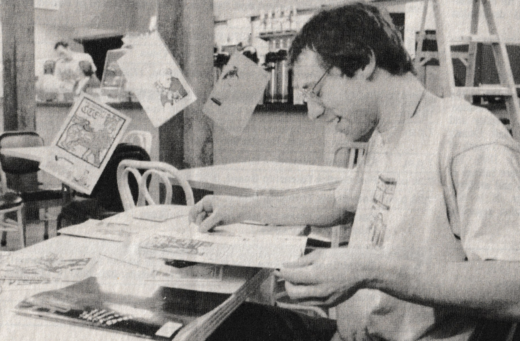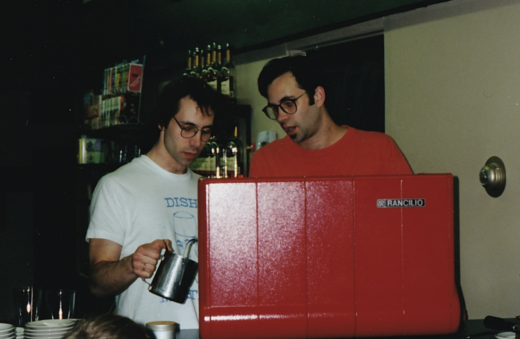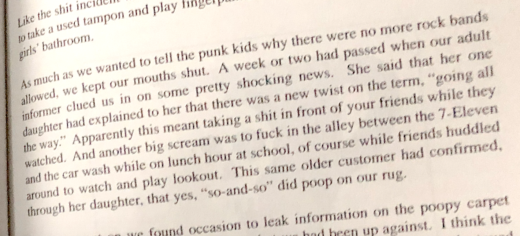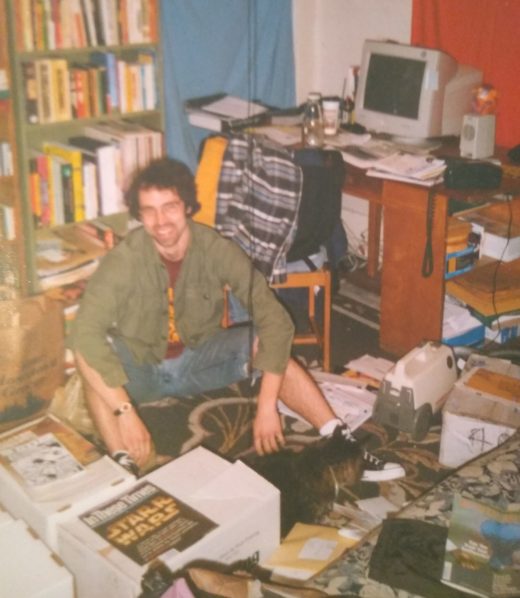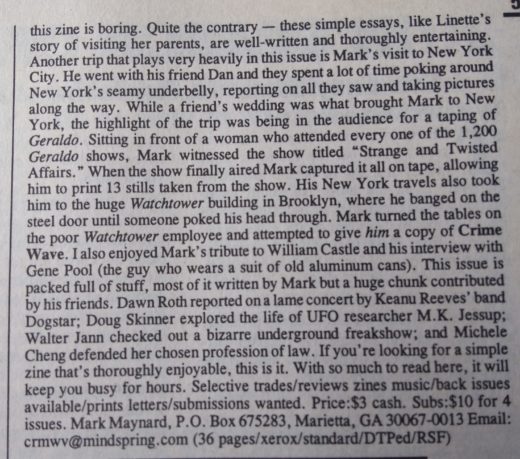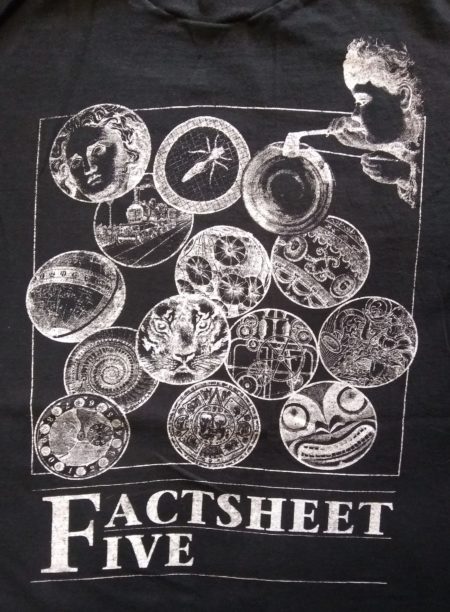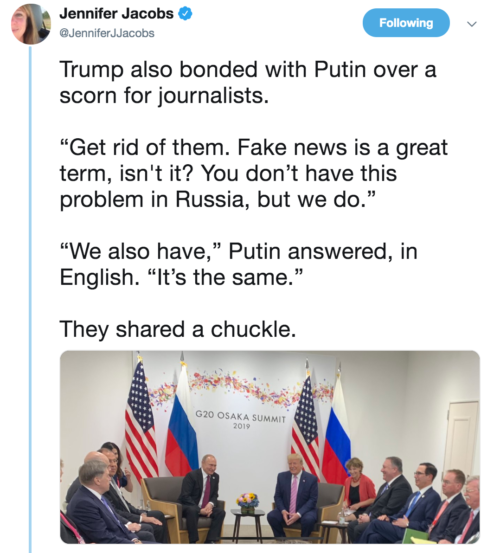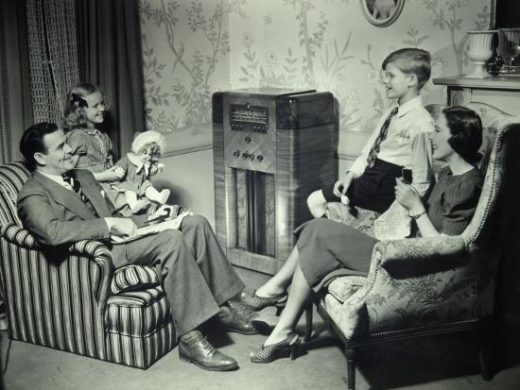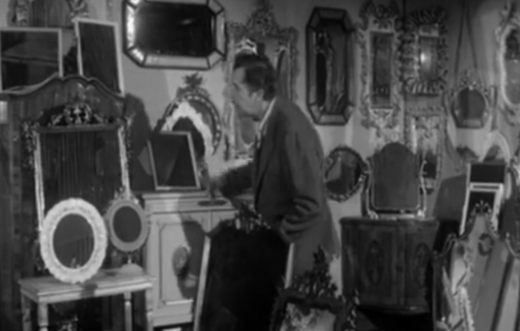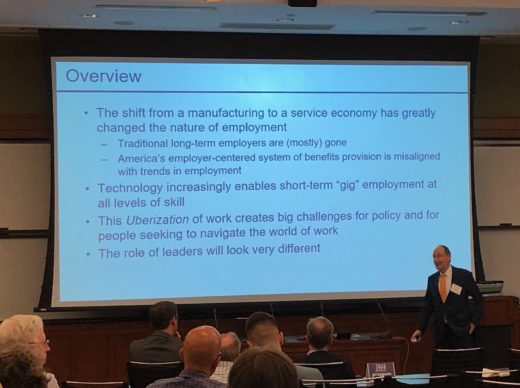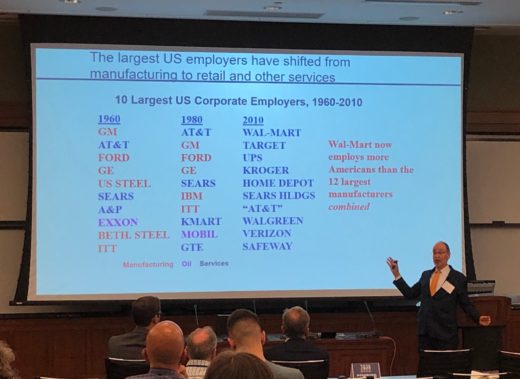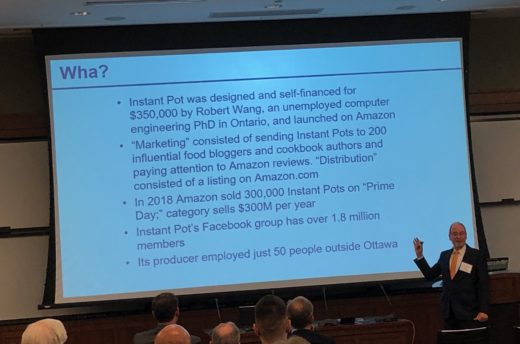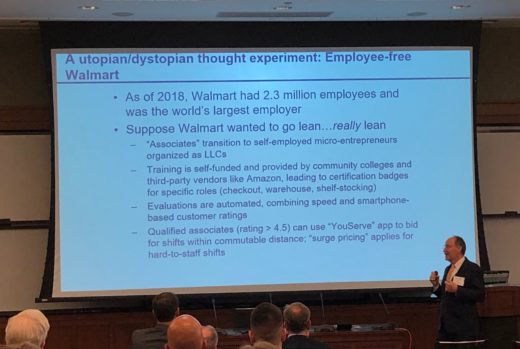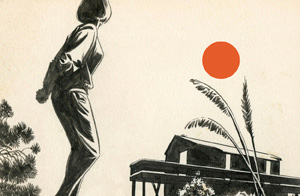When I interview people for this series, I invariably ask them how they came to know about the existence of the underground press — how they came to discover that there were actually brilliant, obsessed people out there in the world who weren’t waiting to get professional writing jobs, but instead just doing it themselves, self-publishing their own zines, about whatever in the hell they wanted. And, more often that not, people respond to that question by telling me how they first stumbled across Factsheet Five, the magazine started by 1982 by Mike Gunderloy to chronicle the evolution of what would eventually be referred to as “the zine revolution”. Well, today we’re going to be talking with Christopher Becker, the man who killed Factsheet Five in 1998, bringing that revolution to an end… at least for a while.
[above: Photo of Christopher Becker by Tony Pitts of the Port Huron Times Herald circa 1994, taken from the article, “Zine Exhibit Brings Copy-Making to an Art Form”.]
MARK: How was it that you first became aware of Factsheet Five?
CHRISTOPHER: I think I first saw Factsheet 5 at a weird little bookstore in Chicago in the Wrigleyville neighborhood, where I was living at the time. It was probably the summer of 1991. I’ll never forget that little bookstore. There were bunnies and other animals running around, eating little bits of the books and magazines. When I saw Factsheet 5, and a bunch of zines, I was just awestruck.
MARK: Like actual wildlife, in the store, just nibbling away at their books and zines? Given that this took place in Chicago, I was going to ask if might have been Quimby’s, but I don’t think that they ever had rodents running wild in the store. Their logo is a two-headed kind of rat-like creature, though.
CHRISTOPHER: No, it was like some guy just wanted to open up a cool and weird little shop in the neighborhood. I’m probably wrong, but it seems like those awesome kinds of discoveries are rarer now than they used to be. I mean, Heather McAdams had her own little shop too, where she made money by showing movies and selling her artwork and calendars. Can you imagine just opening a shop and paying rent and having your business model be, “I’ll sell some books and magazines that my rabbits will bite the corners off of”? Or, “I’ll show funny little movies and sell artwork about country music and have fun and let’s see what happens”? Those are my kind of people.
MARK: I’m tempted to say that young people today are just less interesting, but it probably has more to do with the fact that retail rates are so prohibitively high in the kinds of places where young, creative people with energy want to live. I mean, it’s difficult to do that kind of thing if you have to put down a $5,000 deposit on a tiny space, and then pay a few grand a month in rent, right? Or, here’s another possible explanation… You and I aren’t seeing these kinds of magical things happening anymore because we’ve gotten old, and we’re no longer out exploring the world around us with the enthusiasm that we once were.
No, I think young people today are just a lot less interesting.
CHRISTOPHER: [Laughs.] Yeah, I try to be generous and aware of my own life changes and limitations, and then I still end up back on things being less interesting today. But then I go to Dreamland and see one of the weirdest performances of my life, or go on Twitter and see all this great artwork that people are making. I don’t know.
MARK: Where you aware of zine culture at all before you visited that bookstore in Chicago?
CHRISTOPHER: No, I don’t think so. That’s why it was such a revelation. It was like the entire world opened up. I was going to liken it to discovering the internet, but the zine world was so much more joyful and amazing… Actually, though, now that I think about it, I do remember one exposure to zines prior to walking into that store in Chicago. I’d seen an early issue of Dragon magazine, in which they reviewed a bunch of gaming zines, like Alarums and Excursions (which is still one of my favorite titles for a zine). But, even after reading the article, I still didn’t get what zines were… How could you publish your own magazine? Who would buy it? And why?
MARK: Speaking of why someone would do something so foolhardy as publish a zine, would I be right to assume that, before joining Factsheet Five, you’d published a zine of your own?
CHRISTOPHER: Yeah. My brother Kevin and I put out our a zine for a while called Accusation, Suspicion, & Innuendo. We also had a coffee shop in Port Huron, Michigan from the spring of 1993 to the spring of 1994, where we sold all kinds of zines, comics, and magazines, including Factsheet 5, Murder Can be Fun, King Cat, ReSearch books, Dirty Plotte, 8-Track Mind, etc… We were big Factsheet 5 fans. I started collecting Michigan zines for a one-day Michigan zine show, and hung them all from the ceiling with fishing line at arm level, so you could just wander around and read them all. So I had this sense of gathering zines in my head when I moved to Seattle, where I put out a zine reviewing all the Washington state zines that I could find. That zine was called 22 Fires, and it came with a cassette tape of little-known musicians from across the state.
[above: Christopher and his brother Kevin working behind the counter at Port Huron’s Coffee Grounds in May, 1994.]
MARK: You didn’t, by any chance, know a kid by the name of Forest Juziuk back when you had the coffee shop, did you? The years may be off, and he may have been too young, but he’s from Port Huron, as I recall, and he seems like the kind of kid who might have ridden his bike to a coffee shop like the one you’re describing.
CHRISTOPHER: [Laughs.] Yes, Forest used to come in. His sister was also a regular, and dating another guy who used to come in all the time. Forest and I wrote back and forth for a few years after the coffee shop closed. Then, one day, I was in downtown Ann Arbor, buying music at Wazoo, and he was working there. He looked at me and said, “Did you used to have a coffee shop in Port Huron?” I couldn’t believe it. I was so happy to see him again. When he was living in the Ann Arbor/Ypsilanti area, he would often introduce me to people who remembered Coffee Grounds.
MARK: OK, I just talked with Forest, and he confirms that his sister introduced him to Coffee Grounds. And he also said that you were one of the biggest influences in his young life. In fact, he said that he cried when, at about 13 years old, he heard that you were going out of business. And, not just that, but he credits you, in a roundabout way, with introducing him to me. “Had it not been for Coffee Grounds and Chris Becker,” he said, “you and I would never have met. PERIOD.” It’s kind of interesting to think about these little connections, and how interwoven everything is, isn’t it?
CHRISTOPHER: I’m flattered that he would say that. We just never know how our lives will ripple and intersect with those of other people. There are probably parts of most people that would love to be recognized and famous as a musician, or an artist, or a coder, or whatever. But having these real connections with people is so much better. Forest might say otherwise, but he was always going to be the person he was bound to be. The same is true for me, and everyone else. I wanted to see a movie like Eraserhead before I even knew movies like that existed. I knew that interesting and weird stuff was out there and always wanted to get my hands on it. All my brother and I did with Coffee Grounds was fill in the blanks for people like us.
MARK: OK, Forest said I need to have you tell the story about the time “someone took a shit in the back room of Coffee Grounds – like, not in the bathroom.” He then went on to add that said shit was deposited on a Brannock Device — one of those contraptions they use to measure feet in shoe stores.
CHRISTOPHER: My brother actually wrote a book about our experiences at Coffee Grounds, and he tells that story. Here’s an excerpt. (They actually shit on the floor and then covered it up with the Brannock that was decoration in the back room.)
[above: The above excerpt is from Kevin Becker’s “Aisle 3BA”. The entire story can be found here.]
MARK: Speaking of the desire to be recognized, Linette and I, to our knowledge, have only been identified in public three times because of our zine. And one of those times was by a young Forest Juziuk. So you apparently trained him well… We were in a Borders store when he came up to us, said that he was a fan of Crimewave, and introduced himself… It’s weird that I can’t remember all kinds of truly important things, but I remember the three times that strangers came up to me and said, “Hey, I love Crimewave.” You’re right that personal connections are more important than fame, but fame, even in really super small doses, is a powerful drug.
CHRISTOPHER: I think lots of people have a fantasy about being a little famous as a musician or writer or something. Or just knowing a famous person. I think lots of the “likes” on social media are a hopeful click sent out saying “See me! I’m here,” and I’m not putting that down. If some of my heroes wanted to meet me for coffee I would be so starstruck because they decided to spend some of their time with me.
MARK: 22 Fires sounds incredible… Before we talk about it, though, I’d like to ask what the impetus was behind your first zine, Accusation, Suspicion, & Innuendo… What were you hoping to accomplish with it?
CHRISTOPHER: It wasn’t the best zine, but we got better. We just put in any kind of writing, reviews, design, and comics that we wanted. It was no “Editor’s Choice,” that’s for sure! But we got better, and maybe I’m selling it short. It was just a classic expression of our lives and ideas. But we were still putting it out when I was in Russia, so I’m proud of that.
MARK: I’m curious as to the order of events here. In ‘91 you were in Chicago. And in ‘95 you were in San Francisco, working at Factsheet Five. Did all of this other stuff happen between those two years… the coffee shop in Port Huron, the zine in Washington State, the time in Russia? Were you just always on the move?
CHRISTOPHER: I wrote out my timeline so I could get it straight.
Fall 1990: moved to Chicago
Jan 1992: moved to Russia
Fall 1992: moved to Czechoslovakia
Spring 1993: back to Port Huron to open up Coffee Grounds
Spring 1994: moved to Seattle (yes, so A, S, I #7 came out in the spring of 1994 just before moving)
Spring 1995: moved to San Francisco
Jan 1999: moved to Chicago (again)
I think that’s about right.
MARK: Were you being chased by someone?
CHRISTOPHER: [Laughs.] I just wanted to see and do as much as I could. I have such vivid and fond memories of living in all these places and the people I met that, for many years, I felt like I had one foot in the past and one in the present all the time.
MARK: What were you doing in Russia?
CHRISTOPHER: I was teaching English. But as soon as I got there, the local coordinator had a heart attack, so I was left to my own devices to figure out what I was doing.
MARK: Were you getting paid at least, or did you just have to live on the streets for a year, getting by on your own wits? I’m picturing you eating stale blini out of trash cans and sleeping in unlocked cars.
CHRISTOPHER: Such a strange time. I didn’t drink or smoke so I was cut out of a lot of social interaction. (When I went back to Russia in grad school, I decided I would smoke, but it looked so ridiculous that I couldn’t keep up the facade.) I stayed in various places, sometimes second vacant apartments of students in exchange for English lessons, in people’s houses… It was almost a hallucinatory time full of a lot of wandering alone with occasional strange interactions with people.
MARK: Did you grow up in Port Huron?
CHRISTOPHER: I grew up on the farm outside Port Huron. I always wanted to see more and get out. The funny thing is that it’s small towns where the really weird things happen — not New York and LA. Like our bizarre coffee house, and our great zine show, were in Port Huron, not Ann Arbor. We met the most unusual, legendary characters when we had the coffee shop. Even though there are more people, and more ideas, in a bigger city, rent is higher, and those truly unique people seem to have their wildest creative urges blunted by the time they move to larger areas.
MARK: What can you tell us about the time you spend on 22 Fires, before your creative urges blunted? I’m particularly interested in how you got word out to musicians and zine-makers across the state of Washington at a time when most people probably still didn’t have access to the internet.
CHRISTOPHER: For the zines, at first I found them through Factsheet 5 and bought them all, but then I started finding lots on my own. I really liked the statewide focus and met some great people through it. Just now I remembered one zine called Milky out of Seattle. It was all about milk and milk-like substances. He was a friendly and funny guy. For music, I approached people I liked. There was a great street musician in Seattle. I bought his tape, and he let me put one of his songs on. It was called, By the Time I Get to Phoenix. Others were through zines. It was a lot of fun to work on that.
MARK: And how did you come to start working with Factsheet Five publisher R. Seth Friedman in ‘95? My guess is that you started remotely, reviewing zines for him, and, over time, you were just sucked further and further in, until there was no escape… but I suppose it’s possible that you came to the job some other way, like a want ad.
CHRISTOPHER: I had been sending my zines to Factsheet 5 since before Seth took it over. And Factsheet 5 was certainly my inspiration for 22 Fires. Well, one day Seth called me up and asked if I wanted to review some zines that he would send me. I guess he liked what I wrote, because at some point he asked me if I wanted to move to San Francisco and work at the magazine. I couldn’t believe it. It was really a dream come true.
MARK: So there wasn’t any kind of formal interview process?
CHRISTOPHER: No, he really took a chance on me. I mean it’s a close working relationship, close quarters, and writing is such a personal thing. But it worked out with us.
MARK: How did Seth describe the job to you? What did you think that you’d be doing when he asked you to come out to San Francisco?
CHRISTOPHER: I guess we didn’t really talk about it much. I drove from Seattle to San Francisco in a rented UHaul truck that I declined the insurance on. I was a nervous wreck driving all night with poor headlights and then crossing the mountains in the snow. I got so tired, but, whenever I pulled over, there was no place in the truck to lie down. And turning the truck off meant no heat. It was such a relief when I finally saw the sun coming up and the ground was flat. I showed up with no place to park, no exact idea of where to go, and no place to live. I stayed a night or two at Seth and Miriam’s apartment, then found a place in Lower Haight. Ugh, that was not a great place to live. But I had a place. I probably didn’t even know that I would be working out of Seth’s apartment, but it didn’t really faze me.
MARK: What can you tell us about the workplace environment? I’m picturing a really dangerous workspace… teetering floor-to-ceiling stacks of zines… the threat of eminent suffocation perpetually in the air.
CHRISTOPHER: [Laughs.] That was my bedroom after I took over the editor position. Oh my god, I was living down the street from Seth in a house with 2 other roommates, and I crammed my couch/bed, stacks and stacks of zines, all my own books, my computer, and my music collection into one room. It got to be a nightmare after a while because I was surrounded by unread zines all day and night. Seth’s place was much saner. Every day I would ride my bike to the post office in Upper Haight, and I had this stubborn pride that no matter how much mail, and how many packages, and however many boxes there were, I was going to get back to Seth’s in a single trip. Some days it was like a Dr. Seuss illustration of an impossibly balanced load. So I would get to Seth’s apartment, dump everything out on the floor and we would start sifting through it and dividing it up.
One day there was a minor, but noticeable earthquake and being from Michigan where the ground doesn’t usually move, it was quite alarming. I was out of my chair running for the door to get outside. I’ll never forget Seth yelling from the other room “Exit FoxPro, exit FoxPro!” FoxPro was the database we were using at the time, and there was no way I was going to sit there waiting for a program to shut down while the ground was shaking.
MARK: So there wasn’t an actual Factsheet Five office somewhere… It was all just run out of Seth’s apartment, with you doing most of your work either in your room, or at a nearby coffee shop?
CHRISTOPHER: For the first few years, when I was working with Seth, it was all out of his apartment. I sat in the living room while he worked in his office. It worked. I have a lot of fond memories of Seth.
MARK: Care to share one?
CHRISTOPHER: When I think of Seth, what really comes to mind more than specific memories is his totally disarming laugh. And when he would be excited about something everything just seemed right.
[above: Becker in the cramped San Francisco bedroom where he reviewed zines for Factsheet Five.]
MARK: By the time that your tenure ended at Factsheet Five, what were your duties? How had your responsibilities evolved?
CHRISTOPHER: At first, I was writing zine reviews (lots and lots of them) and then I started writing a regular column about various things in the zine world. My favorite one was about all the amazing shapes and designs that I saw zines come in. How much can you do with a fastener and some paper? I was amazed. The first cover I got to decide on was Mary Fleener’s image of a many-armed woman making a zine. I loved how it came out. I also got to pick an editor’s choice zine, which felt like a huge honor. But one of my favorite parts was editing the issue after all the writing was done. I would sit in my favorite coffee shop The Blue Danube (lots of pictures and links online) between Seth’s apartment and my place and read all those reviews.
[above: Factsheet Five cover by Mary Fleener.]
MARK: This discussion about Factsheet Five cover art has me wondering if there’s an archive somewhere? When the magazine was shut down, what happened to everything? I was just talking with Darbie Romeo of Ben is Dead, and she was telling me about how her zine archive wound up at UCLA… Did anything from Factsheet Five get preserved?
CHRISTOPHER: There are several libraries that have partial collections of Factsheet 5 zines. There’s one in New York that Mike Gunderloy donated to, one in (Oregon?) that Seth donated to, and I’m trying to get the Ann Arbor District Library to take all my boxes and boxes of zines, but I think UM or MSU will be a better fit. Oh god, all those issues of Luhey!
MARK: [Laughs.] OK, for the uninitiated, could you please describe Luhey?
CHRISTOPHER: To this day, I’m still baffled by T.R. Miller who published the Luhey cartoons. As best as I can describe it, his work was like those saccharine “Love is…” cartoons of the 70s with the little naked boy and girl. Only his main character was a floppy-eared dog named “Luhey.” And he must have sent them to every zine publisher he could find from the pages of Factsheet 5. I never found out what was going on with him. Did he lead a really lonely life? Was he developmentally disabled? Was he just a tireless goofball?
MARK: I can’t remember when Linette and I won the prestigious “Editor’s Choice” award for our zine, Crimewave USA, but I’m thinking it must have been during your tenure… and I’m wondering if you might have had a hand in that. If so, thank you.
CHRISTOPHER: I do remember Crimewave USA from Factsheet 5, but it was Seth that made it an Editor’s Choice (from issue 59). Sometimes a zine is just so amazingly put together from the writing to the design that you are so happy to feature it. We saw so many zines that were uninspired or that we had seen before, a lot of really good zines, and then a few that were just incredible. So much work went into them. There was rarely debate about which zines to make an editor’s choice, not that we really discussed it… Here, if you don’t have a copy, is your write-up.
MARK: Did anyone ever try to threaten, bribe, or trick you into giving them the Editor’s Choice Award? Where there ever, for instance, attempts at seduction?
CHRISTOPHER: Unfortunately, the zine world didn’t offer any of those in an attempt to make it big in the pages of the Factsheet 5. I just remember the grumbling over the eventual division between short listings and full reviews, and the people upset over the ad placement for zine reviews. The last few issues of the magazine would offer cover scans for money and some people were upset about that.
MARK: I see that you write it out as “Factsheet 5”. Is that just shorthand on your part, or would you prefer me to use that spelling?
CHRISTOPHER: I think that goes back to an old style guide of Seth’s. I guess some habits die hard.
MARK: But it was spelled out on some of the covers, though, right? I know, on the cover of the Factsheet Five Zine Reader, the book that Seth put out, the 5 is spelled out. I don’t want to make this the focus of the interview. [“In this chapter of The Untold History of ZINES, Mark gets to the bottom of the great Factsheet Five spelling controversy!”] I just want to get it right for the historical record.
CHRISTOPHER: I know I have Seth’s old list of spelling conventions around here someplace but can’t quite locate it. First, what would compel me to still have that? And second, you are right, in many places, “Five” is spelled out.
MARK: Were there editorial decisions that you and Seth did debate, quarrel over, etc? And thank you, 25 years after the fact, for the award. It meant a lot to us… and still does. It was one of the best “mailbox opening” experiences in my life.
CHRISTOPHER: We never really clashed. I knew it was his magazine, I knew what it was when I came aboard, and I supported the magazine’s stand on free speech. We reviewed lots of things that we didn’t necessarily support ourselves, and followed the news of obscenity lawsuits around the country — Mike Diana comes to mind but there were others. I think it was a good match between Seth and I — politically and personality-wise… And you’re welcome!
MARK: Was there a line that you wouldn’t cross. I know you probably reviewed things like Answer Me, but did you go beyond that? Were there instance where, for instance, people would submit overtly white supremacist publications?
CHRISTOPHER: I don’t really remember any white supremacy stuff, but there was probably some. Maybe the medium is kind of self-selecting. It’s funny, I used to be baffled, and a little miffed at the uniformity of topics that zines covered, and wrote an editorial about it once. Where were all the zines about model railroading? Or the Kingston Trio fanzines? Or the crochet zines? For all the vaunted range of expression in zines, they sure seemed to follow the same topics after a while… Not that I’m asking for more white supremacy zines to read.
MARK: For people that might never have seen an issue of Factsheet Five, can you give a sense of what we’re talking about here? I mean we’re talking about thousands of reviews, right? And the zines kept flooding in… I’m curious as to how you talked about this never-ending task of yours… Did you have a favorite metaphor for it? Did you see your work as shoveling out the Augean stables, or rolling a rock uphill for eternity like Sisyphus…
CHRISTOPHER: Oh, after a while it was daunting and exhausting. And it wasn’t fair for a new zine publisher to be dismissed just because I was tired of seeing so many zines. We talked a lot about censorship, and read about it in zines, but I came to feel there was another kind of limit on distributing your work. There was so much out there that really good writing, and hard work could be missed under the pile of mail every day. And I knew that Factsheet 5 was more of a descriptive listing than an actual review magazine. We tried to be neutral about most things, unless we were really excited about a zine. Obviously we couldn’t read every story in every zine, but we did as much as we could. But my god, if you didn’t get through that day’s mail, you could so easily get behind.
MARK: So did you have a formal policy of trying to review everything that came in? If so, were there exceptions to that rule?
CHRISTOPHER: There were things I reviewed quickly so that we could get them out of the house as fast as possible. My housemate John reviewed lots of the sex zines we got. The ones I saw were funny and creative: Hair to Stay (“For Men Who Love and Appreciate Natural, Hairy Women”), Black Giantess, sploosh videos… I don’t remember Seth ever saying we were not going to review something because of its politics or because it was taboo. I can’t remember if he kept reviewing a zine that the publishers called “Factsheet 5” or not. He also hated envelopes full of glitter.
MARK: Yeah, I’d forgotten that someone had started publishing a zine called “Factsheet Five”. What was the story there?
CHRISTOPHER: I don’t think the rival “Factsheet 5” publication lasted too long. I do remember a more heated exchange between Seth and and the publisher of Subliminal Tattoos/Rude. The publisher seemed a bit unhinged and wrote some long and really nasty letters to several people in the zine community. The cranks could be pretty vocal and sometimes scary, but most people seemed pretty cool.
MARK: OK, before we move on, you should probably tell people sploosh videos were, and why you were reviewing them in a publication about zines.
CHRISTOPHER: Yeah, it’s funny. These were pretty tame porn videos, mostly women in jello, mud, or other oozy liquids. And they would, you know, just sploosh around. Kind of ASMR slime videos but with sex. Why were we reviewing those? I guess it was because we reviewed almost anything people sent in, including music and movies.
MARK: As you mentioned earlier, Factsheet Five was actually “(more of a) descriptive listing than an actual review magazine.” Was it difficult not to cross the line, and start making value judgements on these zines that you were seeing? Did you ever want to say something like, “For my money, if I were into the adult baby lifestyle, I’d rather read Zine X,” or whatever?
CHRISTOPHER: Oh, there were times, yes. After you’ve seen the mishmash music/show/scene report/comics/story zine 100s of times, sometimes it was hard to muster something new and especially neutral to say about another one. Sometimes zines were outright boring. I think zines with some central theme or some clear voice are the most interesting to read. But looking back, I’m glad we weren’t reviewing zines exactly for quality. I had my doubts some of the time. But the whole point of zines was connecting with people. God, most of my zines were pretty boring! But I kept at it, mostly just for myself. Would it have helped anyone to say “Don’t waste $1 on this. I’ve seen it all before.” And I did write a rare negative review. Sometimes I had trouble with experimental poetry and Leftist theory zines debating Kropotkin or anarcho-syndicalism. It just didn’t interest me much at the time.
The other thing Seth did, wisely, is give zines to people who were excited about whatever topic they were reviewing. He and I got the most zines, but we tried to earmark lots of zines to people who would be particularly enthusiastic.
MARK: I know there were a few changes of management between the launch of Factsheet Five back in ‘82, and the point when R. Seth Friedman acquired it in ‘92, but I’m curious if you ever had any interaction with the zine’s founder, Mike Gunderloy?
CHRISTOPHER: After I’d moved to San Francisco, I contacted Cari Goldberg Janice and got the last Factsheet 5 t-shirt from her, and I think all the old issues of Factsheet 5 from her too. But I don’t think I ever talked to Mike.
MARK: I didn’t know there were Factsheet Five t-shirts when Gunderloy was running things. Do you, by chance, have a photo?
CHRISTOPHER: Yes… Here it is.
[above: Factsheet Five t-shirt produced during the Gunderloy era.]
MARK: I’m not sure what I was expecting, but I guess this kind of makes sense, given Mike’s interest in sci-fi and fantasy. I’m curious if you and Seth ever thought of selling t-shirts, and, if so, what kinds of ideas you might have had… I guess what I’m getting at is how you would have summed up your vision of the zine world on a shirt during your tenure, and how it would compare to Mike’s vision when he made this shirt.
CHRISTOPHER: I’m glad you asked. One idea of Seth’s that I always liked was a small sticker to put up in bathrooms that said “Don’t you wish you had a copy of Factsheet 5 right now?” Even now, I think about making him one and sending it to him. But about your question, what would a t-shirt have looked like? I like the old design of all the different strands the magazine represents. But I would have to go with something like Mary Fleener’s cover. It perfectly represents the fun of putting a zine together.
MARK: As for my earlier question about whether or not you’d ever reached out to Gunderloy, I was just curious, given the number of times that the magazine had changed hands, if there was ever any interaction between the previous owners… Like if you and Seth ever had any cause to call Mike and ask him anything.
CHRISTOPHER: Seth was probably in touch with Mike at some point, but once you leave Facthseet 5, you’re kind of done with it. I couldn’t understand how that could happen until I was ready to just be done with it.
MARK: I’d read a quote from Seth once where he said that he’d decided to revive Factsheet Five because he thought that it was “too important to die,” and because no one else was doing it. Was there a sense that you kind of had an obligation to keep this huge monstrosity of a thing lurching forward?
CHRISTOPHER: For me it was more that I was so grateful that someone else had done the hard work of keeping it around so that I could enjoy it. It was important and touched a lot of people’s lives in small ways, but I didn’t feel an obligation to keep it going. When I was in it, I was so happy to be a part of it. But by the time we ended it, we were tired, and things were changing. I don’t always like setting the internet up as a rival, but asking how much self expression on the internet replaced zines is a valid question. We were also somewhat antithetical to zine culture in that we were a central source of information.
MARK: I’d never thought of it that way… that Factsheet Five was antithetical to zine culture in that it positioned itself as a definitive guide to the underground press, which pushed back pretty hard against the idea of cultural gatekeepers. I’m curious if that was something that you and Seth debated. Did you try to find ways to address that tension?
CHRISTOPHER: Not really. I think we just saw so much use in what we were doing. Plus, we didn’t have too much time for strategizing or long-term thinking. Every day the zines poured in.
MARK: According to the ZineWiki, at the magazine’s height, when you and Friedman were running things, you had about eight contributing editors, and twenty regular contributors and freelancers. Not only that, but, according to the same source, the company was grossing an estimated $130,000 a year. Does that sound accurate?
CHRISTOPHER: Seth handled the subscribers and the finances. I probably knew at some point, but now have no idea. I mean maybe $130,000 gross is possible, I don’t know. But once you pay printers and then get all those returned copies of an issue, how much is left? Seth was not living the high life, that’s for sure. As far as the contributors go, some issues did have a lot. But you might get 15 reviews from some of them. It wasn’t like a stable of reporters and at times having so many people sending in a handful of reviews could make it more time-consuming.
MARK: I seem to recall, shortly after you moved to Ann Arbor, where you live now, getting together at our house, and you mentioning to me that, toward the end, you’d gotten to the point where, riding your bike to work, you’d cross over the Golden Gate Bridge, and just think about jumping… that the workload had gotten that unmanageable. Am I remembering that correctly?
CHRISTOPHER: It was worse than that. I was riding home, thinking about the stress of the magazine, and how and why I could never give up a position that meant so much to me. “I know!,” I thought. “I’ll just jump off the Golden Gate Bridge.” Well, I quickly came to my senses and thought, “No, I’ll just quit.” That quitting was not my first idea shows how entrenched I was.
MARK: So, what happened?
CHRISTOPHER: I told Seth, and he was pretty understanding. It was a relief. He was burned out too. We looked for someone to take it over, but I was pretty honest with people. Ruel Gaviola (Amusing Yourself to Death) was thinking about it for a little while, but he passed on it. I stayed in San Francisco, working at Borders, and eventually found another bookstore job. Speaking of that other bookstore… One of the best “small world” experiences I had was when I was working at EMU and the professor in the office next door to mine stopped over and asked me if I’d lived in San Francisco, and I looked at him and said, “Rob!” It was one of my old bosses from that travel bookstore, Rob Halpern. I couldn’t believe it. This is one example of what it was like to be in the city at that time and at that time of my life. There were so many interesting people doing creative things. They may not have stayed in the city, but there was so much going on for a time.
MARK: That’s so weird. So you not only know Forest, but you worked for Rob and Lee… As I’ve interviewed Lee here before about the book shop in San Francisco, I was wondering if you might have an anecdote or a memory to share.
CHRISTOPHER: One funny memory I have of working with Rob and Lee is that once, after a customer had just left, they said, “That was some Midwestern accent!” And I said, “Yeah!”, and they looked at me and said, “What are YOU talking about? That’s how you sound!”, and we just laughed.
MARK: So, back to Factsheet Five, is is safe to say that, at least in a roundabout way, it was your departure that caused the magazine to fold for the last time?
CHRISTOPHER: That’s right. I’m proud to have taken it out on its last issue.
MARK: Would you mind if I titled this interview: “Christopher Becker: The Man Who Killed Factsheet Five”? Or would you prefer something like, “Christopher Becker: The Man Who Stopped the Zine Revolution”?
CHRISTOPHER: Either one is okay with me. But the “killed” title is more optimistic, as I hope the zine revolution is still going on…
MARK: I’m fascinated by the many publishers of Factsheet Five and what happens to them. I don’t know if it’s true, but I heard that Gunderloy had moved to a farm somewhere, but it looks as though he’s doing web architecture stuff.
CHRISTOPHER: It’s funny to think that former editors/publishers of Factsheet 5 all go into computers. Mike became a Ruby coder, Seth became a coder, I went to a coding bootcamp and worked for 2 years as a coder. Why would that be?
MARK: If I had to guess, I’d say they turn to coding because “grave-digger” is no longer a profession. I mean, isn’t coding pretty much the most solitary profession that a person can have these days? Maybe serving at the helm of Factsheet Five just makes you want to be alone.
CHRISTOPHER: Really it baffles me. Sometimes I think it’s this drive for organizing data. And an interest in all these disparate threads of life.
MARK: With that said, do you ever miss putting out Factsheet Five?
CHRISTOPHER: Oh, I miss so much of it. I got to meet so many amazing people. I lived with John Held, a larger-than-life figure in the alternative art scene who was a legendary rascal and also reviewed for Factsheet 5. John Marr of Murder Can be Fun also lived in the neighborhood, and joined Seth’s poker game. Ashley Parker Owens, who did Global Mail. Ramsey of AK Press. Just hanging out with Seth and Miriam was a lot of fun. It was such an exciting time. But some of my nostalgia is just for that other time in my life when there was more time to be with friends, more time to be creative.
MARK: I was going to ask you about the poker games… What can you tell us about them?
CHRISTOPHER: So much fun and what characters. Seth, Miriam, John Marr, Mark Saltveit of Palindromist, Jared Pore (another Factsheet 5 editor), me, and this other squirrely funny guy whose name I could never remember. I was never that good at poker but laughed a lot. I still remember some of the games invented there: Queen Descending, Alien Invasion, etc. After I moved to Ann Arbor, I used to have Seth Friedman Commemorative Poker nights and would send him postcard invitations.
MARK: Can you talk at all about the circumstances surrounding the launch of your competitor, Zine World?
CHRISTOPHER: There were people who thought Factsheet 5 was too big or too commercial. I can understand that. Factsheet 5 was really a magazine, and in some ways was the arbiter of zines and zine culture, whether we wanted it to be that or not. The publishers of Zine World might have also had some animosity towards Factsheet 5 if I remember correctly (but it’s been a long time). Not all of the mail we got was nice.
MARK: So you didn’t see Factsheet Five as a zine? Does this go back to the point you made earlier about how a zine wouldn’t position itself as a single source of knowledge on a subject, or is there more to it?
CHRISTOPHER: You know it’s a blurry line. But having it make enough money to pay people full-time seems to land it in the magazine side of things.
MARK: Can you talk a bit about the kind of letters that you’d get?
CHRISTOPHER: As a zine publisher, I would get the most personal letters from people. It was this gush of intimacy to connect with someone through the mail. At Factsheet 5, we still got letters, but not as many as you would think. Sometimes we would have to read their zines to see how excited they were at being reviewed.
Speaking of letters, though, I just went through the letters and issue requests for one of my zines and I was struck with how long some of them are. Some people wrote me pages and I didn’t even know them. I guess there was more time in those days and zines seemed very personal. I suppose people respond that way to blogs too but man, writing a letter and mailing it had a real kind of intimacy that email lacks.
MARK: Agreed. It was like we must have had all the time in the world.
CHRISTOPHER: That says it exactly. I keep thinking about how my days and my time go now and I was so busy at Factsheet 5 but I never felt like the days were rushing by.
MARK: Speaking of Zine World, I’m curious if you ever had any occasion to interact with the magazine’s founder, Doug Holland, the man behind the zine Pathetic Life, who also lived in San Francisco at the time.
CHRISTOPHER: We never crossed paths.
MARK: Do you recall exchanges with other zine publishers, good or bad?
CHRISTOPHER: I don’t remember publishers that I didn’t get along with. But there were lots that I looked up to and wanted to hang out with more: Ashley Parker Owens, Candi Strecker, Julee Peezlee… And when I would get a new King Cat (by John Porcellino) to review it was always so relaxing. It felt very personal somehow because I had been such a fan before Factsheet 5.
MARK: Where there any big ideas that you had for the future of Factsheet Five that you never had a chance to roll out? Was there ever talk, for instance, of hosting a zine conference, opening a store, or trying your hand a distribution?
CHRISTOPHER: God no. We were just getting burned out. And Seth put his book together which was kind of the final evolution of the whole thing. We did go to small press shows once in a while and had a lot of fun, but never thought of organizing anything ourselves. The other idea I had a couple years ago was to take a couple years making a documentary of zine publishers and what that time was like. It’s partly just an excuse to talk to people I always wanted to meet, but also a chance to document something that is really dear to me. And it would be better to do it sooner rather than later. I’m just glad we have your interviews because I think that is one of the few detailed descriptions of those people and those times.
MARK: Speaking of distribution, it always seemed like that was the biggest problem we faced as an industry, if you can call it an industry. It just seemed like there was all this energy and potential, and the spread of Kinko’s was putting production within reach of people, and Factsheet Five was helping with exposure, but there just wasn’t a reliable mechanism to get zines in front of people in any reliable way, outside of, say, Tower Records, and a few good stores, like Atomic Books and Reading Frenzy. The distributors out there, like Desert Moon, were just abysmal.
CHRISTOPHER: Yeah, and when a distributor goes under, you’re out the money that they owe you.
MARK: Any regrets? Are there things you wish you’d done differently with Factsheet Five?
CHRISTOPHER: I almost wrote that I regret hauling box upon box of zines across the country, and then to another five houses after that! But no, I really don’t have any regrets. I squeezed as much out of my time there as I could. In the end I published as much as I wanted to and made memories I’ll always have. It was a very happy time of my life.
MARK: Except for wanting to jump from the Golden Gate Bridge….
CHRISTOPHER: Yeah. Don’t do that.
[note: If you like what you’ve read and want more about the American underground press and the people behind it, be sure to check the other interviews in the History of Zines series.]

